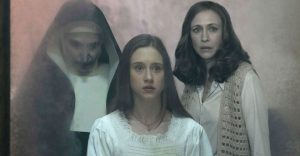The Best Sci-Fi Movies Of 2020

Which sci-fi movies emerge among the best in the year 2020? Cinema, along with movie-viewing experiences, have witnessed a massive shift in 2020, a year that felt straight out of a science-fiction dystopia, replete with a global pandemic triggered by an elusive, ever-evolving virus.
Owing to the visceral nature of horrors embodied by the events that transpired this year, 2020’s sci-fi movies have come to grant a form of cathartic escapism for those who need it the most. With some of the most-anticipated sci-fi blockbusters such as Dune and The Matrix 4 being shifted ahead in the calendar, a strange vacuum has been created in the genre, allowing certain under-the-radar flicks to shine.
The merits of science fiction as an artistic genre are endless, the most important being its ability to birth alternate worlds while raising fundamental philosophical quandaries about the nature of reality and the human psyche. Sci-fi author Arthur C. Clarke once described the genre as “the only genuine consciousness-expanding drug,” a statement not far from the truth, as epitomized by works like 2001: A Space Odyssey and Blade Runner. While life imitates art, the roles are often reversed, as exemplified by countless films that attempt to capture and evoke emotions that often remain unexpressed in real-world scenarios.
12. Vivarium

Existential angst and the cruel indifference of the universe often make for a promising sci-fi premise, such as in the case of Lorcan Finnegan’s sophomore feature, Vivarium. Starring Jesse Eisenberg and Imogen Poots, Vivarium dives deep into the caverns of horror, a tenet embedded within nature, opening with a close-up shot of an unformed baby bird writhing in its nest. Couple Tom (Eisenberg) and Gemma (Poots) arrive at a housing development named Yonder on the lookout for their forever home.
Amid absurd narrative events and the bizarre behavioral tics of real estate agent Martin, the duo walk into house no.9, a box-shaped house painted a nauseous shade of minty green – a structure they can’t escape. Vivarium evokes the atmospheric tautness of The Twilight Zone while disrupting the romanticism of “white picket-fenced” suburban dwellings. While the film does not rely upon subtlety in its narrative style and execution, Vivarium is a delightful entry concerning unrelenting domestic anxieties.
11. Bill & Ted Face the Music

Although this threequel to sci-fi comedy blockbuster Bill & Ted’s Excellent Adventure does not make one wonder about quantum consciousness, Bill & Ted Face The Music is a heartfelt journey into the comforting lanes of nostalgia. Directed by Dean Parisot, Bill & Ted Face The Music follows Alex Winter and Keanu Reeves as Bill and Ted, respectively, wherein the duo needs to belt out a stellar track in order to bring the world together and prevent the destruction of space and time.
Ever-confident of their ability to pull off this feat, Bill and Ted decide to time-travel into the future to snatch the composition from their future selves. This ensues in a fun-filled ride into the past and the future, featuring characters such as Jimi Hendrix (DazMann Still) and The Grim Reaper from Ingmar Bergman’s The Seventh Seal, the latter being a sweet callback to Bill & Ted’s Bogus Journey. Armed with likable characters, a cerebrally-light premise, and absurd humor, Bill & Ted Face The Music emerges as a genuinely joyful take on the otherwise thematically-heavy genre.
10. Tenet

After being delayed thrice due to the COVID-19 pandemic, Tenet failed to break even, despite grossing $361 million worldwide, which makes it the fourth-highest-grossing film in 2020. Tenet revolves around a CIA agent, the “Protagonist” (John David Washington), who participates in an undercover operation at a Kyiv opera house. Although the film has been likened to Nolan’s Inception in terms of narrative depth and intricacy, Tenet features a convoluted plot heavy on exposition, as it delves into the concepts of non-linear thinking, temporal paradoxes, and backward-moving entropy. Nevertheless, the film is backed by strong performances by Robert Pattinson and Elizabeth Debicki, along with breathtaking visuals and impressively-executed action sequences that carry Nolan’s signature mastery of cinema as a reality-altering visual medium.
9. Sea Fever

Neasa Hardiman’s Sea Fever emerges as eerily-pertinent amid the pandemic, as it puts forward a mirrored premise in which the crew of an Irish trawler are marooned at sea, wherein a mysterious parasite infects their water supply. Offering a dramatized version of terror-induced quarantine in a sci-fi setting, Sea Fever opens with marine biology student Siobhán (Hermione Corfield), whose flaming-red hair provokes superstitious crew members to brand her as an omen of ill luck. However, couple Gerard (Dougray Scott) and Freya (Connie Nielson) allow her on board, after which their journey takes on a murkier route. The primary reason why Sea Fever works well as a pandemic thriller is the way in which it raises nominal questions about the unpredictability in such scenarios, although its central structure does come off as derivative of films such as Contagion.
8. The Platform

Few films are capable of embodying a dizzying sense of absurd dread that can be labeled as Kafkaesque, yet Spanish director Galder Gaztelu-Urrutia’s debut feature, The Platform, manages to pull this off with ease. A cautionary tale and timely political allegory unveiling the disastrous repercussions of residing in a world submerged in cruel self-absorption and greed, The Platform is an especially brutal, but much-needed awakening.
The film opens in a brightly-lit kitchen, but soon descends into the pits of madness, until it zooms on Level 48, wherein Gerong (Ivan Massague) remains imprisoned. His cellmate Trimagasi (Zorion Eguileor) has chosen this hellhole over a psychiatric facility after an accidental murder, brings in a unique dynamic to the narrative, often acting as conscious commentary when he says: “Hunger unleashes the mad man in us… it is better to eat than be eaten.” – a grim acknowledgment of the horrors of the world we live in.
7. Love and Monsters

Life in an underground bunker would not exactly be appealing for most people, especially if the Earth’s surface was ridden with giant mutant reptiles, but that is not the case for Joe (Dyan O’Brien), who remains surprisingly upbeat despite such dire circumstances. Michael Matthews’ Love and Monsters leans more towards the fun, fantastical side of science fiction, offering the audience an escape through a simplistic, yet satisfying worldview in the face of near-extinction. In Love and Monsters, Joel must assume the hero’s journey, as it is essentially a coming-of-age story of an individual who freezes in the face of danger, a conventional “non-hero”, so to speak, and the result is a smorgasbord of classic movie callbacks that enrich the narrative, including I Am Legend and Zombieland.
6. Archive

Gavin Rothery’s debut feature, Archive, excels in re-purposing long-standing narratives that revolve around AI, with the aid of an effectively-sterile ambiance and a compelling central drive. An isolated scientist (Theo James) pursues an AI ideal, leading him to develop a sequence of android beings until the achievement of a promising prototype. While the film’s central plot seems derivative of Black Mirror and Ex Machina, Archive is able to incorporate its divergent influences into a coherent, comprehensive whole. There is an echo of the Frankensteinian themes of creator and creation, featuring an intense psychological fragmentation within the mind of the maker. It is interesting to witness Archive foraying into oft-overlooked nuances of android behavior, which ultimately holds the potential to propel AI towards the achievement of singularity, an idea that is thrilling and terrifying all at once.
5. Synchronic

Drug-fueled sci-fi horrors often make for a mind-bending ride, especially if the intricacies of time travel are thrown into the mix. Justin Benson and Aaron Moorhead’s Synchronic checks both of these boxes, as it takes a deep dive into the lives of New Orleans paramedics Steve (Anthony Mackie) and Dennis (Jamie Dornan), who deal with a series of bizarre accidents. After the disappearance of Dennis’s eldest daughter, Steve stumbles upon a potent psychedelic that can alter the very fabric of reality and time.
Keeping Albert Einstein’s declaration about time in mind, which he describes as a “stubbornly persistent illusion”, the merit of Synchronic lies in the temporary disruption of this illusion, which is a commendable feat in the thematically-saturated sci-fi genre. Synchronic is a riveting slow-burn, akin to a drug that takes hold of the senses like an overlooked detail, but the film picks up pace in an almost frenetic manner towards the end. Backed by genuine suspense and a well-executed ending, Synchronic makes for an adrenaline-tinged watch that lingers on the mind well after.
4. The Invisible Man

Based on H.G. Wells’ eponymous novel, The Invisible Man is a terrifying tale, mostly due to the fact that it is intrinsically rooted in the mundane and subverts genre tropes in interesting ways. The Invisible Man is a deeply synesthetic experience, dripping with atmospheric dread, heightened by Benjamin Wallfisch’s haunting score, as it follows Cecilia (Elisabeth Moss), who is fresh out of an abusive relationship with wealthy scientist Adrian (Oliver Jackson-Cohen). After Adrian is declared dead, Cecilia finds herself being stalked by an invisible man, which pushes her further towards the edge of sanity. While the trope of the unsee-able as a source of horror is a dominant one in the genre, The Invisible Man adds authenticity to the trope with its treatment of sequences devoid of cinematic trickery. A sense of real terror and brutal honesty pervades the film, making it an especially disturbing watch.
3. Possessor

David Cronenberg is a master of horror, having added nightmarish depth to the genre through the likes of Scanners and Dead Ringers. His son Brandon Cronenberg’s latest effort, Possessor, positions him as a worthy contributor to the Cronenbergian legacy, as the film masterfully delves into the themes of elusive identity, the pitfalls of modern technology, and the utter madness that often resides within the human psyche. Possessor circles around Tasya Vos (Andrea Riseborough), the titular possessor who finds her core identity more tainted with each mission of coerced mind control. When tasked with “possessing” Colin Tate (Christopher Abbott), things take an even bloodier turn, as the host fights the forced invasion, leading to clashing identities and consciousness’, which places Possessor as a portal to an unnerving experience.
2. The Vast of Night

Andrew Patterson’s riveting indie entry, The Vast of Night, encapsulates the claustrophobic paranoia that pervades current times, the events of which are set over the course of a single night in the fictional town of Cayuga, New Mexico. Fay Crocker (Sierra McCormick) and Everett Sloan (Jake Horowitz), the town’s switchboard operator and local station DJ, respectively, hear a static-like, rhythmic sound that ties back to a covert government mission. Then on, The Vast of Night steps over the threshold of the preternaturally strange, while building solid, evocative moments that rely upon smartly-placed sonic cues. The Vast of Night is a dizzying odyssey about the fear of fear itself – that irrational, yet intuitively primordial response to fight-or-flight situations – and ends in a manner that is immensely rewarding and satisfying.
1. Color Out of Space

The true lull of sci-fi movies, especially Lovecraftian horror lies in the fact that it often provokes images of the indescribable, making adaptations of the same a daunting task. When one stumbles upon a world that precedes time and eclipses the confines of human comprehension itself, all they are left with is a dread so unexplainable, that one has to feel it to believe it. Color Out Of Space manages to capture this feeling in otherworldly hues and is set in a quaint farm owned by the Gardners, who move here to escape the drudgery of the city.
Nathan (Nicholas Cage) takes up farming with much gusto, while his wife Theresa (Joely Richardson) recovers from a recent cancer battle, and his kids Benny, Jack, and Lavinia struggle to adjust. Unsettling, yet mundane events occur, including the sudden emergence of strange flowers, bitter produce, and a tainted water supply, which give way to a phantasmagoric second half featuring witchcraft, disembodied sounds, and pure, unfiltered cosmic horror. Color Out of Space is a love letter to Lovecraftian madness, steeped in eldritch nightmares that are bound to leave one spellbound.
About The Author


















